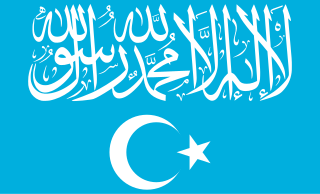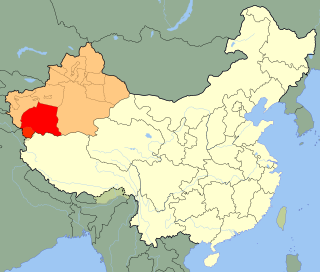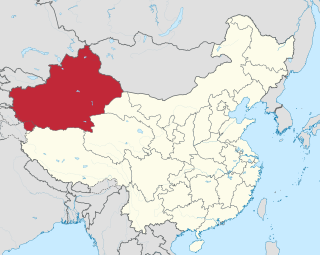Related Research Articles

Khunjerab Pass is a mountain pass in northern Pakistan that lies at an elevation of 4,693 meters above sea level. It is located in the Karakoram and holds a significant strategic position on the northern border of Pakistan, specifically in the Gilgit-Baltistan's Hunza and Nagar Districts. Additionally, it is positioned on the southwestern border of China, within the Xinjiang region.

The Uyghurs, alternatively spelled Uighurs, Uygurs or Uigurs, are a Turkic ethnic group originating from and culturally affiliated with the general region of Central and East Asia. The Uyghurs are recognized as the titular nationality of the Xinjiang Uyghur Autonomous Region in Northwest China. They are one of China's 55 officially recognized ethnic minorities. The Uyghurs are recognized by the Chinese government as a regional minority and the titular people of Xinjiang.

East Turkestan or East Turkistan, also called Uyghuristan, is a loosely-defined geographical region in the northwestern part of the People's Republic of China, which varies in meaning by context and usage. The term was coined in the 19th century by Russian Turkologists, including Nikita Bichurin, who intended the name to replace the common Western term for the region, "Chinese Turkestan", which referred to the Tarim Basin in Southern Xinjiang or Xinjiang as a whole during the Qing dynasty. Beginning in the 17th century, Altishahr, which means "Six Cities" in Uyghur, became the Uyghur name for the Tarim Basin. Uyghurs also called the Tarim Basin "Yettishar," which means "Seven Cities," and even "Sekkizshahr", which means "Eight Cities" in Uyghur. Chinese dynasties from the Han dynasty to the Tang dynasty had called an overlapping area the "Western Regions".

The Turkistan Islamic Party (TIP) is a Uyghur Islamic extremist organization founded in Pakistan by Hasan Mahsum. Its stated goals are to establish an Islamic state in Xinjiang and Central Asia.

The East Turkestan independence movement is a political movement that seeks the independence of East Turkestan, a large and sparsely-populated region in northwest China, as a nation state for the Uyghur people. The region is currently administered by the People's Republic of China (PRC) in the Xinjiang Uygur Autonomous Region (XUAR). Within the movement, there is widespread support for the region to be renamed, since "Xinjiang" is seen by independence activists as a colonial name. "East Turkestan" is the best-known proposed name as it is the historical geographic name of the region and the name of the two independent states that briefly existed in the region in the first half of the 20th century.
Terrorism in China refers to the use or threatened use of violence to effect political or ideological change in the People's Republic of China. The definition of terrorism differs among scholars, between international and national bodies and across time and there is no legally binding definition internationally. In the cultural setting of China, the term is relatively new and ambiguous.

The 2008 Kashgar attack occurred on the morning of 4 August 2008, in the city of Kashgar in the Western Chinese province of Xinjiang. According to Chinese government sources, it was a terrorist attack perpetrated by two men with suspected ties to the Uyghur separatist movement. The men reportedly drove a truck into a group of approximately 70 jogging police officers, and proceeded to attack them with grenades and machetes, resulting in the death of sixteen officers.
The Chinese people in Pakistan comprise one of the country's significant expatriate communities. The China-Pakistan Economic Corridor has raised the expatriate population, which has grown from 20,000 in 2013 to 60,000 in 2018.
The Asian Muslims Human Rights Bureau was a group said to have been organized to aid Muslim expatriates in Asia that had ties to Osama bin Laden and Al-Qaeda. It was reported to have been led by a "Pakistani citizen of Xinjiang origin" -- a Uyghur named Abdul Rasul.

Immigration to Pakistan is the legal entry and settlement of foreign nationals in Pakistan. Immigration policy is overseen by the Interior Minister of Pakistan through the Directorate General Passports. Most immigrants are not eligible for citizenship or permanent residency, unless they are married to a Pakistani citizen or a Commonwealth citizen who has invested a minimum of PKR 5 million in the local economy.

Kashgar or Kashi is a city in the Tarim Basin region of southern Xinjiang, China. It is one of the westernmost cities of China, located near the country's border with Kyrgyzstan and Tajikistan. For over 2,000 years, Kashgar was a strategically important oasis on the Silk Road between China, the Middle East, and Europe. It is one of the oldest continuously inhabited cities in the world and has a population of 711,300 people. Kashgar's urban area covers 15 km2 (5.8 sq mi), although its administrative area extends over 555 km2 (214 sq mi).
Pakistanis in China consist largely of temporary residents, including international students and cross-border traders. They are concentrated in the Xinjiang autonomous region of Northwest China.

The Kumul Rebellion was a rebellion of Kumulik Uyghurs from 1931 to 1934 who conspired with Hui Chinese Muslim General Ma Zhongying to overthrow Jin Shuren, governor of Xinjiang. The Kumul Uyghurs were loyalists of the Kumul Khanate and wanted to restore the heir to the Khanate and overthrow Jin. The Kuomintang wanted Jin removed because of his ties to the Soviet Union, so it approved of the operation while pretending to acknowledge Jin as governor. The rebellion then catapulted into large-scale fighting as Khotanlik Uyghur rebels in southern Xinjiang started a separate rebellion for independence in collusion with Kirghiz rebels. The various groups of rebels were not united. The main part of the war was waged by Ma Zhongying against the Xinjiang government. He was supported by Chiang Kai-shek, the Premier of China, who secretly agreed to let Ma seize Xinjiang.

The 2011 Kashgar attacks were a series of knife and bomb attacks in Kashgar, Xinjiang, China on July 30 and 31, 2011. On July 30, two Uyghur men hijacked a truck, killed its driver, and drove into a crowd of pedestrians. They got out of the truck and stabbed six people to death and injured 27 others. One of the attackers was killed by the crowd; the other was brought into custody. On July 31, a chain of two explosions started a fire at a downtown restaurant. A group of armed Uyghur men killed two people inside of the restaurant and four people outside, injuring 15 other people. Police shot five suspects dead, detained four, and killed two others who initially escaped arrest.

The Pishan hostage crisis occurred on the night of December 28, 2011, in Koxtag, Pishan/Guma County, Hotan Prefecture, Xinjiang Uygur Autonomous Region, China. A group of 15 ethnic Uyghur youths kidnapped two goat shepherds for directions near the Indian and Pakistan borders. They were soon confronted by a group of five Pishan policemen, who tried to negotiate for the shepherds' release. This led to a shootout in which a police officer and 7 hostage-takers were killed. Another police officer was injured, and 4 suspects were taken into custody. Both of the hostages were rescued by police.
The 2012 Yecheng attack was a terrorist attack by Uyghur separatist extremists that occurred on February 28, 2012, in Yecheng, Xinjiang, a remote town situated about 150 miles from China's border with Pakistan. Details of the attack are disputed: according to Chinese government reports and court documents, at around 6 p.m. that day, a group of eight Uyghur men led by religious extremist Abudukeremu Mamuti attacked pedestrians with axes and knives on Happiness Road. Local police fought with the attackers, ultimately killing all and capturing Mamuti. State-run media reported that one police officer died and four police were injured, while 15 pedestrians died from Mamuti's assault and 14 more civilians were injured. Chinese officials characterized the event as a "terrorist attack."

The Xinjiang conflict, also known as the East Turkistan conflict, Uyghur–Chinese conflict or Sino-East Turkistan conflict, is an ongoing ethnic geopolitical conflict in what is now China's far-northwest autonomous region of Xinjiang, also known as East Turkistan. It is centred around the Uyghurs, a Turkic ethnic group who constitute a plurality of the region's population.
On the early morning of Wednesday, 30 July 2014, Juma Tahir, the imam of China's largest mosque, the Id Kah Mosque in northwestern Kashgar, was stabbed to death by three young male Uyghur extremists. Religious leaders across denominations condemned the attack.

The Chinese government is committing a series of ongoing human rights abuses against Uyghurs and other ethnic and religious minorities in Xinjiang that is often characterized as persecution or as genocide. Beginning in 2014, the Chinese government, under the administration of Chinese Communist Party (CCP) General Secretary Xi Jinping, incarcerated more than an estimated one million Turkic Muslims without any legal process in internment camps. Operations from 2016 to 2021 were led by Xinjiang CCP Secretary Chen Quanguo. It is the largest-scale detention of ethnic and religious minorities since World War II. The Chinese government began to wind down the camps in 2019. Amnesty International states that detainees have been increasingly transferred to the formal penal system.
The 2014 Yarkant attacks occurred in Yarkant County in Xinjiang on 28 July. Authorities stated that an armed gang of masked militants carried out attacks against civilians as well as local police across towns in the county.
References
- ↑ https://dzen.ru/a/Y7nr3SMGQETzz7ag
- 1 2 Sun, Jincheng (19 July 2009), "巴基斯坦维族华人领袖:新疆维族人过得比我们好/Pakistan Uyghur leader: Xinjiang Uyghurs live better than us", Global Times Chinese Edition, retrieved 14 September 2009
- 1 2 3 Rahman 2005 , p. 60
- ↑ Rahman 2005 , p. 50
- 1 2 Ali, Wajahat (29 May 2004), "China says terrorists from Xinjiang hiding in Pakistan", Daily Times, retrieved 25 March 2009
- ↑ "From Uyghurs to Kashgari: A Pakistani community finds itself caught between two worlds", The Diplomat, 20 December 2013, retrieved 15 May 2015
- ↑ Hadid, Diaa (15 November 2018). "'My Family Has Been Broken': Pakistanis Fear For Uighur Wives Held In China". NPR. Retrieved 1 April 2020.
- ↑ "China frees 'lost' Uighur wives but at a price, families say". Bangkok Post. 30 April 2019. Retrieved 12 April 2020.
- ↑ Haider 2005 , pp. 525–6
- ↑ Liuhto, Maija (15 January 2019). "'China is after us': Uighurs in Pakistan report intimidation". Al Jazeera. Retrieved 1 April 2020.
- ↑ Haider 2005 , p. 526
- ↑ "巴基斯坦北部华裔维吾尔人/Uyghurs of China in Northern Pakistan", Broadcasting Corporation of China, 23 February 2009, retrieved 26 July 2009
- ↑ "From his Pakistan hideout, Uighur leader vows revenge on China". Saud Mehsud, Maria Golovnina. Reuters.
- 1 2 Haider 2005 , p. 535
- ↑ "Nine Uyghur militants extradited to China", The Daily Mail, Pakistan, 28 April 2009, retrieved 11 May 2010
- ↑ "Uighur militants eliminated from Pakistani territory: Asif". The Express Tribune. 18 October 2015. Retrieved 18 October 2015.
- ↑ Shohret Hoshur; Shemshidin, Zubeyra (6 April 2010), "Pakistan Uyghurs in Hiding: Brothers blame raids and arrests on pressure from China", Radio Free Asia, retrieved 11 May 2010
- 1 2 3 "EDITORIAL: Uighur terrorism in Pakistan", Daily Times (Pakistan) , 27 June 2006, retrieved 29 April 2010
- ↑ Starr 2004 , p. 144
- ↑ B. Raman (22 December 1998), Osama bin Laden: Rumblings in Afghanistan, South Asia Analysis Group, archived from the original on 13 June 2010, retrieved 26 June 2009
- ↑ B. Raman (14 March 1999), Continuing unrest in Xinjiang: An Update, South Asia Analysis Group, archived from the original on 14 June 2011, retrieved 26 June 2009
- ↑ Baruah, Amit (6 August 2007). Dateline Islamabad. Penguin Books India. ISBN 9780143102465 – via Google Books.
- ↑ "Promoting Japanese culture: Japan confers prestigious award on Hamdard chief". 3 February 2019.
- Sources
- Haider, Ziad (2005), "Sino-Pakistan relations and Xinjiang's Uyghurs: Politics, Trade, and Islam along the Karakoram Highway" (PDF), Asian Survey, 45 (4): 522–545, doi:10.1525/as.2005.45.4.522, archived (PDF) from the original on 7 May 2012
- Rahman, Anwar (2005), Sinicization beyond the Great Wall: China's Xinjiang Uighur Autonomous Region, Troubador Publishing, ISBN 978-1-904744-88-7
- Starr, S. Frederick (2004), Xinjiang: China's Muslim borderland, M.E. Sharpe, ISBN 978-0-7656-1318-9
- "Displaced dreams: Uighur families have no place to call home in G-B", The Express Tribune, 21 May 2015, retrieved 21 May 2015